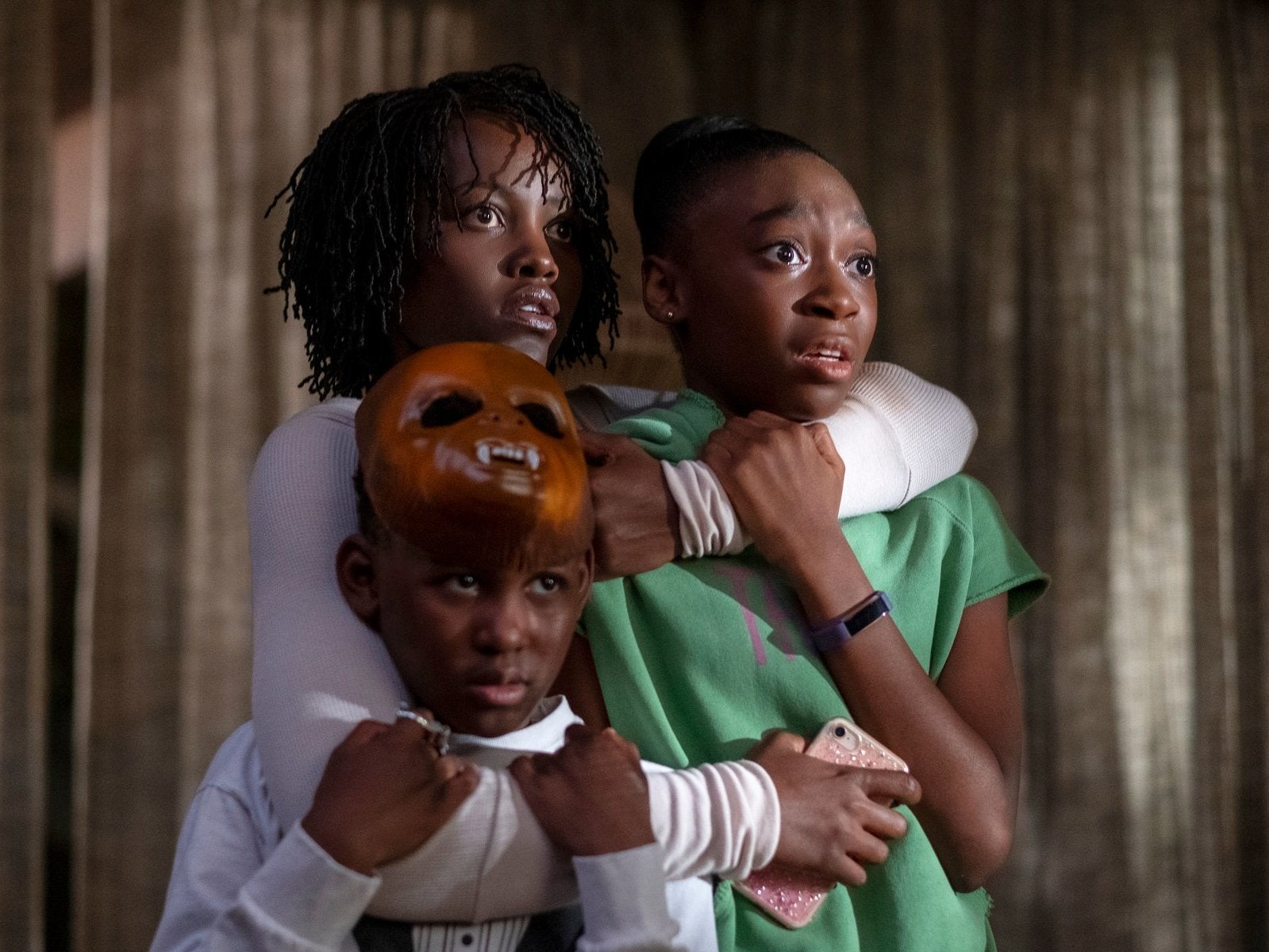The Independent's journalism is supported by our readers. When you purchase through links on our site, we may earn commission.
How Jordan Peele is pushing horror forward by looking to the past
With ‘Us’ and ‘Get Out’, writer-director Peele is quickly establishing a legacy that feels tethered in history, writes Clarisse Loughrey


Your support helps us to tell the story
From reproductive rights to climate change to Big Tech, The Independent is on the ground when the story is developing. Whether it's investigating the financials of Elon Musk's pro-Trump PAC or producing our latest documentary, 'The A Word', which shines a light on the American women fighting for reproductive rights, we know how important it is to parse out the facts from the messaging.
At such a critical moment in US history, we need reporters on the ground. Your donation allows us to keep sending journalists to speak to both sides of the story.
The Independent is trusted by Americans across the entire political spectrum. And unlike many other quality news outlets, we choose not to lock Americans out of our reporting and analysis with paywalls. We believe quality journalism should be available to everyone, paid for by those who can afford it.
Your support makes all the difference.I want your eyes, man. I want those things you see through.” This line from 2017’s horror hit Get Out may not be the film’s most famous moment, but counts as among its eeriest. When we hear it, it’s meant quite literally: a blind art dealer is speaking, revealing he’s after the eyeballs of our protagonist, Chris (Daniel Kaluuya). His entire body, in fact. As we learn, Chris has stumbled into an operation of rich white liberals who transplant their brains into the bodies of black people, and finds himself the latest target. What’s so formidable about the film is that such a simple, sinister concept manages to say so much about racism in America. Black bodies are attacked, commodified, and endlessly appropriated in American society. They’re targeted by police violence, while also being used as background props in the music videos of white pop stars.
There’s no doubt that Get Out deserves its accolades. So does its writer-director, Jordan Peele. The film was a major box office hit, making $225m (£170m) worldwide on a mere $4.5m budget, while also earning four Oscar nominations. It won Best Original Screenplay, making Peele the first black winner in the category. His follow-up, Us, is on track to achieve similar coups. In North America, the film is projected to earn between $35m and $40m on its opening weekend – higher than Get Out’s $33m gross – and early reviews have praised it as an equally sure-footed, in some ways even bolder, offering. USA Today’s Brian Truitt went so far, even, as to declare Peele “this generation’s Hitchcock”.
No other horror film has come close to Get Out in terms of amassing both critical and popular appeal in recent years, although Us may come close to repeating this success. It makes sense if you break down the nature of Peele’s work. Having spent much of his career performing comedy, most notably on Comedy Central’s sketch series Key & Peele, alongside Keegan-Michael Key, he approached the genre of horror with an added weapon in his arsenal. Peele knows the importance of well-timed humour, deploying it strategically to release tension just when the terror starts to feel unendurable. His main aim isn’t to terrorise audiences into sleepless nights, which, in turn, gives his work a greater accessibility. Us has Black Panther’s Winston Duke in the role of the perfect sitcom dad – groanworthy jokes included – while Get Out took a page out of Scream’s book in the character of Rod (Lil Rel Howery), the sidekick well-versed in horror tropes who immediately recognises that sinister things are afoot.
Mixing horror and comedy is hardly a new idea, but there are few directors who can so thoroughly entertain an audience while also delivering layered, nuanced social commentary – the kind that keeps people talking long after the screams subside. While the Purge franchise has done an admirable job of examining America’s deep class divisions, the genre has more recently tended in more psychological directions. Many of the most beloved horror films of recent years have been fixated on personal anxieties made flesh. That’s evident in the themes of grief in Hereditary (2018) and The Babadook (2014), or paranoias around gender and sexuality in It Follows (2014) and The Witch (2015).
However, both Get Out and Us are more accurately described as social horrors. They take the world as we know it, with all its rules and structures, and exaggerate one aspect until it turns nightmarish. As Peele explains on the New York Times podcast Still Processing, these types of films deal “with this human monster, this societal monster. And the villain is us.” What Chris uncovers at the home of his white girlfriend’s parents is merely a literal rendering of the exploitation of black bodies caused by American society at large.
The Sunken Place, a kind of purgatory for the consciousnesses of those with their bodies stolen, has found a metaphorical meaning that stretches beyond the film itself, commonly used now to describe black individuals who appear to be willingly upholding and promoting racist constructs and ideologies. The phrase’s most famous target has been Kanye West, following his public support of Donald Trump. The rapper even posted a picture of his own empty, white-walled mansion with the caption: “Do this look like the Sunken Place?” No one was convinced.
Get Out is clearly about racism in the US, but Peele’s follow-up isn’t so easily categorised. Us is, on simple terms, a story about a middle-class family who arrive to their summer home, only to have their peace interrupted by the arrival of doppelgänger home invaders. Peele has pointed towards the film’s theme here and there in interviews. “We are our own worst enemy,” he said in a recent one. “Not just as individuals but more importantly as a group, as a family, as a society, as a country, as a world. We are afraid of the shadowy, mysterious ‘other’ that’s gonna come and kill us and take our jobs... no one’s taking responsibility for where we’re at.” Indeed, the film is littered with ideas of duality, not just on a personal level, but in American society and in the very foundations of its identity.
Peele has reminded us how much potential the horror genre has when it comes to conceptualising our own world. The Sunken Place has been introduced into popular lingo in a similar way to the phrase “Stepford Wife”, derived from the 1972 Ira Levin novel of the same name and its subsequent 1975 film adaptation. That’s commonly been used to describe women who play into the demands of the patriarchy, swapping personal freedom for subservience and docility. Concepts like “Stepford Wife” or “Sunken Place” offer images that clarify behaviour we can witness in the real world, helping us better understand our own feelings.
Ira Levin’s other famous novel, Rosemary’s Baby, and the 1968 film, vocalised women’s fears that the government had seized control over their bodies. This was the era, after all, when reproductive health became a battleground, with women finally gaining access to the pill, and Roe v Wade legalising abortion nationwide. All the story had to do was swap the conservative politicians for a cult of satanists in search of a surrogate for the Antichrist.

Watch Apple TV+ free for 7 days
New subscribers only. £8.99/mo. after free trial. Plan auto-renews until cancelled

Watch Apple TV+ free for 7 days
New subscribers only. £8.99/mo. after free trial. Plan auto-renews until cancelled
Although it’s easy to assume Peele’s use of horror is a response to the Trump era, that theory doesn’t quite hold up. Get Out was first contemplated during Obama’s presidency, when, as the director told The Washington Post, “there was a sentiment that we had a black president now, so racism is over”. Instead, Peele would be better framed as a scholar of horror. One, specifically, who’s found his own entry-point into the genre. For Get Out, he listed Rosemary’s Baby, The Stepford Wives, Scream and Night of the Living Dead (1968) as influences.
Meanwhile, he has cited The Twilight Zone episode “Mirror Image” as an inspiration for Us. It sees a woman encounter her duplicate in a bus station, becoming convinced it has been sent from a parallel universe to replace her. The 1960s TV series, as a whole, is one of Peele’s biggest influences. (The director will host the upcoming Twilight Zone revival, set to debut on CBS All Access in April.) But Peele has inherited the legacy of the show’s creator, Rod Serling, in more ways than one, adopting its use of horror (although it leaned heavily into sci-fi, as he also does) to explore the kind of social messaging that might otherwise feel too direct or preachy for American audiences. As Serling is upposed to have said: “A Martian can say things that a Republican or Democrat can’t.”
The Twilight Zone remains one of the most impressive experiments in social horror, many of its episodes offering neat allegories for a post-war America. Often, much like Peele’s work or The Stepford Wives, these stories would take place in banal surroundings, with an evil hidden right beneath the surface. “The Monsters Are Due On Maple Street”, often regarded as one of the best episodes in the series, starts with suspicions that aliens have infiltrated the neighbourhood, then swiftly boils over into mob justice. The hysteria doesn’t feel too far removed from reality, considering the episode was shot at the height of the Cold War.
Yet black filmmakers have rarely had the same resources and opportunities needed to explore social horror that Serling did. Peele has looked back to the classics of the past, adopted their gambits, and allowed them to be viewed through the lens of a black man in America. The result is something that feels new, but tethered in history. Steeped in the genre, Peele knows how to manipulate audiences perfectly, making them jump out of their seats while subtly challenging their preconceived notions of the world. With the director teasing four more horror films in the same vein, it’s exciting to watch a legacy like this unfold before our eyes.
Us is out in UK cinemas now
Join our commenting forum
Join thought-provoking conversations, follow other Independent readers and see their replies
Comments